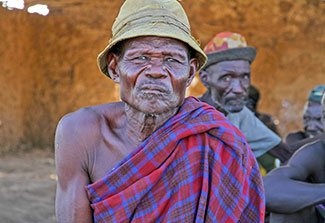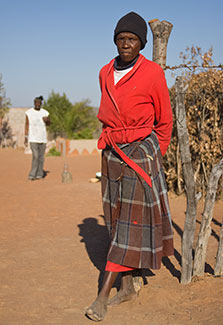
As dementia rises in Africa, urgent need for research
September / October 2018 | Volume 17, Number 5

Photo by Boniface Mwangi via Africa Knows
As the population ages, countries in sub-Saharan Africa need
more dementia research to help curtail what’s described as
an impending crisis.
more dementia research to help curtail what’s described as
an impending crisis.
The aging population in sub-Saharan Africa poses an “impending crisis,” with the number of people with dementia expected to surpass 7.6 million by 2050. That forecast would be a 250 percent increase from current numbers, according to Alzheimer’s Disease International (ADI).
To curtail the growing burden of dementia that’s already costing the region an estimated $6.2 billion each year, experts say there’s an urgent need to study possible risk factors and potential interventions.
“In Africa the prevalence will be climbing unless we do something about it,” said Dr. Adesola Ogunniyi, a professor at the University of Ibadan in Nigeria, who is involved in a Fogarty-supported training program. “We need to do more studies and focus on preventive strategies and then compare risks over time and see how this will pan out.”
Ogunniyi was a co-principal investigator on a long-term NIH-funded project that compared two groups of people of African origin living in different settings - African Americans in Indianapolis, Indiana and Yoruba in Ibadan, Nigeria. The longitudinal study ran from the early 1990s to 2012 and contributed some of the earliest evidence on the prevalence, incidence and risk factors associated with dementia in sub-Saharan Africa (SSA). Its findings of a lower burden of dementia among Yoruba compared to African Americans highlighted the significance of examining interactions between genes and the environment to better understand the condition.
Numerous studies from the project are among those cited in a 2017 ADI report Dementia in sub-Saharan Africa: Challenges and Opportunities, which provided a snapshot of the current situation, reviewed existing evidence and suggested areas for future investigation. More research is needed in almost all areas of the dementia field, the report concluded. It noted most of the evidence is coming from countries in central and western SSA, especially Nigeria, where the few longitudinal studies of potential risk and protective factors have been conducted.
Risk factors merit further study

Photo by poco_bw/iStock/Thinkstock
Women living in sub-Saharan Africa are
at greater risk of dementia than men.
at greater risk of dementia than men.
Age and gender
Gender and increasing age are the risk factors that have been most closely associated with dementia in SSA. Studies found women have a two- to eight-fold increased risk of dementia, attributed to their longevity compared to men, as noted in the ADI report.Genetics
Carrying a form of the apolipoprotein E (APOE) gene is known to increase the risk of Alzheimer’s disease among people in the U.S., but research in sub-Saharan Africa has produced mixed results. An early study from the Indianapolis-Ibadan project found the allele was not associated with Alzheimer’s disease in elderly Yoruba, while a later study with a larger cohort found it was. Studies by researchers in two other countries found no connection. Meanwhile, a novel mutation in another gene, presenilin 1, was found to cause familial, early-onset Alzheimer’s disease in South Africa, affecting 12 people spanning four generations of the same family.Vascular disease
In the Yoruba study, elderly participants with high blood pressure had an increased risk of dementia, compared to people with normal readings. “Hypertension has stood out to be a convincing risk factor,” said Ogunniyi, noting that was a key contribution of the Indianapolis-Ibadan project. He led a study believed to be the first to examine hypertension and dementia in Africa. The risk was most significant with a systolic BP ≥ 160 or diastolic BP ≥ 90. High cholesterol and peripheral artery disease also have been associated with dementia in other studies in the region.Education and literacy
While education is considered a strong mitigating factor in high-income countries - with studies supporting the “cognitive reserve” hypothesis that education may impact onset of the symptoms of dementia - results in SSA are inconclusive. Some studies have found an association between low education and dementia, others found no interaction. When an association has been found, it’s often greater for women than men.Early life
Childhood circumstances such as birthweight and nutrition and their potential role in dementia have not been well-researched in SSA, according to the ADI report. A study in Central Africa found an association between losing a parent in childhood and dementia, but a later investigation found none.Lifestyle and behavior
Diet, alcohol consumption and exercise - known to affect heart and brain health - are also being studied to see if they play a role in dementia. Yoruba Nigerians, whose traditional diet of grains, vegetables and fish is low-calorie and low-fat, were found to have lower cholesterol and a lower incidence of Alzheimer’s disease compared to African Americans in a study from the Indianapolis-Ibadan project. An unrelated investigation in Nigeria examined cognitive impairment after stroke and found that a pre-stroke daily diet of fish and moderate-to-heavy physical activity were protective. Findings on the relationship between alcohol and dementia are mixed.Psychosocial
Having a weak social network has been identified as a risk factor for dementia in SSA studies. Meanwhile, other research suggests Africa’s traditional communal way of living, in which people are surrounded by family and friends, may have a protective effect by keeping the brain active. “This constant stimulation, we think, keeps brain synapses functioning and can reduce cognitive decline,” said Ogunniyi, who reported on the finding as part of the Indianapolis-Ibadan project. He’s now on a research team studying cognitive stimulation therapy, which uses group sessions with activities to stimulate and engage people who have mild to moderate dementia.HIV dementia
Prevalence and risk factors of HIV-associated neurocognitive disorder (HAND) are being studied in SSA, but most of the research relates to young adults. Research in high-income countries (HICs) has shown long-term use of antiretroviral therapy is increasingly resulting in cognitive impairment and dementia, which is likely to be mirrored in SSA as the population living with HIV continues to age. Data on HAND in older Africans “is a current and urgent knowledge gap,” according to the ADI report.Environment
While exposure to neurotoxins - such as copper, lead and aluminum - was not included as a possible risk factor in the ADI study, it was referenced in a Fogarty-led publication on brain disorders across the lifespan as an area that warrants more investigation. Many people living in developing countries experience significant air and water pollution, yet most of the work examining the possible relationship between cumulative exposure and onset of dementia has been done in HICs. There are unique opportunities to advance scientific understanding by conducting studies in SSA and other low-resource settings, the authors suggested. For example, many of the world’s 14 million artisanal gold miners work in parts of Africa where there is little regulation and they are often exposed to high levels of mercury.
Urgent research agenda
While researchers are forecasting a dramatic rise in dementia cases in SSA, public awareness and understanding of the condition in the region are low. Local languages may not even have a word for dementia and people may attribute symptoms to normal aging, or witchcraft, which could lead to stigma and discrimination.
To help SSA countries prepare for a rise in dementia cases as the population ages, the ADI report offers suggestions for an urgent research agenda. Studies estimating the prevalence and incidence of dementia should be a top priority and, when possible, designed to monitor incidence and mortality over time. Other suggested areas for future investigation include:
- The potential effect of genetic and modifiable risk factors that would support implementing risk reduction programs, policies and campaigns.
- The impact of the HIV/AIDS epidemic on dementia, particularly among older people.
- The experience of people with dementia and their caregivers as it relates to stigma, discrimination
and seeking help.
“This report provides important evidence of the huge scale of the challenge we face on multiple fronts in sub-Saharan Africa,” said Alzheimer’s Disease International CEO Paola Barbarino. “Not only is dementia hidden socially, but governments must do more to enhance the infrastructure needed to support those affected.”
More Information
- Dementia in sub-Saharan Africa
Alzheimer’s Disease International, September 2017 - Related NIA-supported projects in NIH RePORTER:
Indianapolis-Ibadan Dementia Research Project - Related Fogarty-supported project:
University of Ibadan MEPI Junior Faculty Research Training Program - Brain disorders across the lifespan: Research to achieve nervous system health worldwide
Nature supplement, November 19, 2015 - Related news: NIH-led effort details global brain disorders research agenda in Nature supplement
Nov/Dec 2015 Global Health Matters
To view Adobe PDF files, download current, free accessible plug-ins from Adobe's website .





















.png)












No hay comentarios:
Publicar un comentario